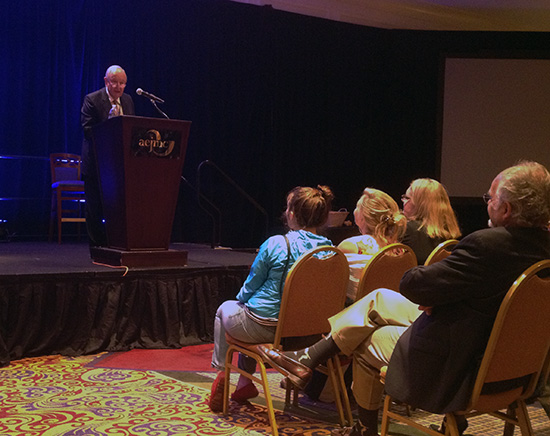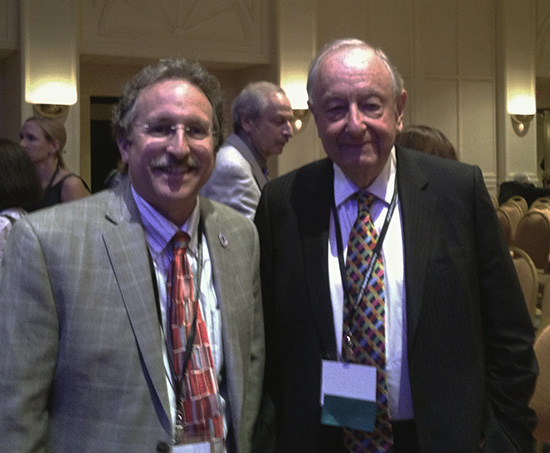Those favoring freedom of speech and behavior should bristle in response to a recent "critique" of U.S. law by a British Lord.
Lord Anthony Lester told professors gathered in Washington, D.C. at the Association for Education in Journalism and Mass Communication (AEJMC) 2013 meeting that the First Amendment goes too far in protecting speech instead of balancing it against reputation and privacy. Celebrities in the U.S., he said, find it "almost impossible" to prove damage to reputation because of the actual malice standard, which requires a litigant to show that media recklessly disregarded truth.
Lord Lester downplayed the important idea that public figures often "thrust" themselves into media publicity. As the Supreme Court said in the 1970s, "The First Amendment requires that we protect some falsehood in order to protect speech that matters."
The Court concluded in Gertz v. Welch (1974):
Hypothetically, it may be possible for someone to become a public figure through no purposeful action of his own, but the instances of truly involuntary public figures must be exceedingly rare. For the most part, those who attain this status have assumed roles of especial prominence in the affairs of society. Some occupy positions of such persuasive power and influence that they are deemed public figures for all purposes. More commonly, those classed as public figures have thrust themselves to the forefront of particular public controversies in order to influence the resolution of the issues involved. In either event, they invite attention and comment.
Even entertainers, athletes and their coaches enter the public arena knowing that the spotlight of publicity will be on them. Often, they exchange the costs of fame for large sums of money and other benefits of stardom.
Lord Lester, though, explained that his country has changed the rules about the cost of defamation litigation "in order to make it easier for the little man or woman" because "only the very rich could afford to bring libel cases." The new laws will be in force by the end of the year, Lord Lester said.
The legislative approach produced an approved bill that was the product of negotiation in dealing with current libel law problems. According to an April story in The Guardian:
The new law will also stop cases being taken in London against journalists, academics or individuals who live outside the country, denting the libel tourism industry, but not ending it altogether, as foreigners will still be able to lodge claims in the high court.
British libel law appears to provide very little protection for social media users. A recent case revealed: "A tweet is more like a broadcast than an email and is subject to the law of libel in the same way."
In an age of social media, Lord Lester's approach can be seen as an elite pushback against the rising voice of the people through new social media tools. So, while the forthcoming British libel law gives ordinary people more power to litigate, it is clear that there is a chill across the pond.
Lord Lester repeatedly mentioned the importance of privacy, common law and international law, but these remain not well defined through human rights cases. Indeed, a fair reading of defamation and privacy law is that much remains unsettled in the courts.
The Defamation Act of 2013 seeks a "reform" to balance "between the right to freedom of expression and the protection of reputation."
Under the new law, before suing there must be evidence that a claimant "suffered serious harm." The law also no longer will favor jury trials over those before a judge, Lord Lester said.
Media will have a defense for "responsible publication on matters of public interest." However, when I asked Lord Lester Aug. 8 to define public interest, he said that the government decided against this in favor of case-by-case decisions. In the U.S., the Federal Communications Commission (FCC) uses a public interest standard for broadcast regulation, but the failure to define it has produced unpredictable decisions.
In the Internet and social media age, Lord Lester's approach is off the mark. The balancing approach ignores the marketplace of ideas emerging on Twitter, Facebook and other social media platforms. Social media truth relies more on crowd-sourcing, instant opinion and social network correction than the law or courts. If someone makes an online attack, social media users expect a near-instant response -- not a libel case.
"We in the rest of the world simply can't understand how you can have a system in which free speech trumps personal privacy," Lord Lester contended. British law, he said, falls between U.S. unbridled freedom and the filtered model of China.
While I enjoyed meeting Lord Lester and hearing his views, we should not follow them. U.S. Internet freedom over more than two decades unleashed the greatest spark of technological innovation ever. The entrepreneurial spirit reinvigorated a sagging industrial economy. Attempts to restrict free speech, rather than providing a balanced approach, ignore serious discussion about big data privacy and whistleblower protection. When asked about this, Lord Lester favored traditional government control. Instead, we need new ways of thinking about how to cultivate free and responsible speech. For active social media users, general reputation is of less importance than cultural content differences, identity and online community interaction.


